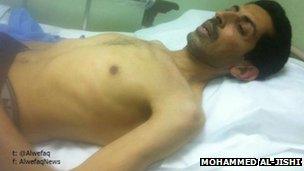Bahrain rejects Danish request for prisoner transfer
- Published

Abdulhadi al-Khawaja's lawyer released this picture of his client in hospital on 3 April
The top legal body in Bahrain has rejected a Danish request to transfer political hunger striker Abdulhadi al-Khawaja, said to be close to death.
A supreme judicial council official said the proposed transfer of the prisoner did not meet the "specific conditions" required for such a move.
Mr Khawaja is protesting against a life sentence he received over protests by the Shia Muslim community.
He has told his family he will not stop his fast, now into its 60th day.
His daughter Zainab, who has been protesting over his plight, was arrested on Saturday for the second time this week and freed again on Sunday morning.
Government divided
Protesters clashed with police this week and human rights organisations have also called for the release of Mr Khawaja, who is being fed intravenously in a hospital clinic.
A special security court convicted him last year of seeking to overthrow Bahrain's royal family, who are Sunni Muslims, during the unrest by the Shia Muslim majority.
The government is badly split on what to do, sources in Bahrain have told the BBC's Bill Law. They say the Foreign Minister, Sheikh Khaled bin Ahmad al-Khalifa, is keen to see a resolution.
However, Prime Minister Sheikh Khalifa bin Salman al-Khalifa insists he should not be released, the sources told our correspondent.
On Saturday, it emerged that Danish Foreign Minister Villy Soevndal had requested the prisoner's transfer, citing the Danish citizenship which he holds.
The request was referred to the supreme judiciary council.
An official there told the Bahraini state news agency: "The hand-over of accused and convicted persons to foreign countries takes place under specific conditions...
"This does not apply in Abdulhadi al-Khawaja's case."
The official did not elaborate.
'Dying with dignity'
On Friday, security forces fired tear gas and water cannon at thousands of supporters of Mr Khawaja.
Other protests have also been held in recent weeks against the motor racing Grand Prix which is due to be held in Bahrain later this month.
Zainab al-Khawaja went on to her Twitter account to give details of a telephone conversation with her father on Saturday.
He could "hardly speak... hardly breathe", she said.
"My Dad said he will not stop his hunger strike and told guards 'If I die, I die with dignity'," she wrote.
"My mother told my Dad that we all support him, that we're proud. We are with him all the way, no matter what he decide[s]."
Human rights group Amnesty International says Mr Khawaja's conviction in June was based on a confession made under duress, and no evidence was presented showing he had used, or advocated violence, during the mass protests early last year.